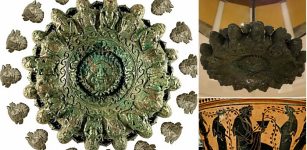4 Things Ancient Greeks And Romans Got Right About Mental Health
AncientPages.com - According to the World Health Organization, about 280 million people worldwide have depression and about one billion have a mental health problem of any kind. People living in the ancient world also had mental health problems. So, how did they deal with them?
Homer on the backgrounf of Chios. original upploader: JW1805 at en.wikipedia). Image of Chios - credit: Panagiotis7 - CC BY-SA 4.0;
As we’ll see, some of their insights about mental health are still relevant today, even though we might question some of their methods.
1. Our mental state is important
Mental health problems such as depression were familiar to people in the ancient world. Homer, the poet famous for the Iliad and Odyssey who lived around the eighth century BC, apparently died after wasting away from depression.
Already in the late fifth century BC, ancient Greek doctors recognised that our health partly depends on the state of our thoughts.
In the Epidemics, a medical text written in around 400BC, an anonymous doctor wrote that our habits about our thinking (as well as our lifestyle, clothing and housing, physical activity and sex) are the main determinants of our health.
2. Mental health problems can make us ill
Also writing in the Epidemics, an anonymous doctor described one of his patients, Parmeniscus, whose mental state became so bad he grew delirious, and eventually could not speak. He stayed in bed for 14 days before he was cured. We’re not told how.
Later, the famous doctor Galen of Pergamum (129-216AD) observed that people often become sick because of a bad mental state:
It may be that under certain circumstances ‘thinking’ is one of the causes that bring about health or disease because people who get angry about everything and become confused, distressed and frightened for the slightest reason often fall ill for this reason and have a hard time getting over these illnesses.
Galen, a famous doctor, believed mental problems were caused by some idea that had taken hold of the mind. Pierre Roche Vigneron/Wikimedia
Galen also described some of his patients who suffered with their mental health, including some who became seriously ill and died. One man had lost money:
He developed a fever that stayed with him for a long time. In his sleep he scolded himself for his loss, regretted it and was agitated until he woke up. While he was awake he continued to waste away from grief. He then became delirious and developed brain fever. He finally fell into a delirium that was obvious from what he said, and he remained in this state until he died.
3. Mental illness can be prevented and treated
In the ancient world, people had many different ways to prevent or treat mental illness.
The philosopher Aristippus, who lived in the fifth century BC, used to advise people to focus on the present to avoid mental disturbance:
concentrate one’s mind on the day, and indeed on that part of the day in which one is acting or thinking. Only the present belongs to us, not the past nor what is anticipated. The former has ceased to exist, and it is uncertain if the latter will exist.
The philosopher Clinias, who lived in the fourth century BC, said that whenever he realised he was becoming angry, he would go and play music on his lyre to calm himself.
Doctors had their own approaches to dealing with mental health problems. Many recommended patients change their lifestyles to adjust their mental states. They advised people to take up a new regime of exercise, adopt a different diet, go travelling by sea, listen to the lectures of philosophers, play games (such as draughts/checkers), and do mental exercises equivalent to the modern crossword or sudoku.
For instance, the physician Caelius Aurelianus (fifth century AD) thought patients suffering from insanity could benefit from a varied diet including fruit and mild wine.
Doctors also advised people to take plant-based medications. For example, the herb hellebore was given to people suffering from paranoia. However, ancient doctors recognised that hellebore could be dangerous as it sometimes induced toxic spasms, killing patients.
Other doctors, such as Galen, had a slightly different view. He believed mental problems were caused by some idea that had taken hold of the mind. He believed mental problems could be cured if this idea was removed from the mind and wrote:
a person whose illness is caused by thinking is only cured by taking care of the false idea that has taken over his mind, not by foods, drinks, [clothing, housing], baths, walking and other such (measures).
Galen thought it was best to deflect his patients’ thoughts away from these false ideas by putting new ideas and emotions in their minds:
I put fear of losing money, political intrigue, drinking poison or other such things in the hearts of others to deflect their thoughts to these things […] In others one should arouse indignation about an injustice, love of rivalry, and the desire to beat others depending on each person’s interest.
4. Addressing mental health needs effort
Generally speaking, the ancients believed keeping our mental state healthy required effort. If we were anxious or angry or despondent, then we needed to do something that brought us the opposite of those emotions.
Watch some comedy, said physician Caelius Aurelianus. VCU Tompkins-McCaw Library/Flickr, CC BY-NC-SA
This can be achieved, they thought, by doing some activity that directly countered the emotions we are experiencing.
For example, Caelius Aurelianus said people suffering from depression should do activities that caused them to laugh and be happy, such as going to see a comedy at the theatre.
However, the ancients did not believe any single activity was enough to make our mental state become healthy. The important thing was to make a wholesale change to one’s way of living and thinking.
When it comes to experiencing mental health problems, we clearly have a lot in common with our ancient ancestors. Much of what they said seems as relevant now as it did 2,000 years ago, even if we use different methods and medicines today.
Provided by The Conversation
This article is republished from The Conversation under a Creative Commons license. Read the original article.
More From Ancient Pages
-
 Legend Of Fintan Mac Bochra Who Escaped The Great Flood And Became The First Man In Ireland
Featured Stories | Aug 26, 2021
Legend Of Fintan Mac Bochra Who Escaped The Great Flood And Became The First Man In Ireland
Featured Stories | Aug 26, 2021 -
 Human DNA Shaped By Past Events Caused Sharp Dips In The Population
News | Jun 27, 2022
Human DNA Shaped By Past Events Caused Sharp Dips In The Population
News | Jun 27, 2022 -
 Unique And Unusually Large 8000-Year-Old Building Discovered At Çatalhöyük Site, Turkey
Archaeology | Sep 26, 2022
Unique And Unusually Large 8000-Year-Old Building Discovered At Çatalhöyük Site, Turkey
Archaeology | Sep 26, 2022 -
 Mystery Of The Large Ancient Boulders In Ireland And Britain – Possible Connection To The City Of Troy?
Featured Stories | Oct 17, 2023
Mystery Of The Large Ancient Boulders In Ireland And Britain – Possible Connection To The City Of Troy?
Featured Stories | Oct 17, 2023 -
 Intriguing Ket People – The Last Nomadic Hunter-Gatherers Of Siberia
Featured Stories | Nov 23, 2023
Intriguing Ket People – The Last Nomadic Hunter-Gatherers Of Siberia
Featured Stories | Nov 23, 2023 -
 Llanbadoc Discovery: Late Medieval Artifact And The Battle Of Usk
Artifacts | Oct 2, 2018
Llanbadoc Discovery: Late Medieval Artifact And The Battle Of Usk
Artifacts | Oct 2, 2018 -
 Discovery Of Queen Nefertiti’s Mummy Will Be Announced Next Month – Zahi Hawass Says
Archaeology | Sep 16, 2022
Discovery Of Queen Nefertiti’s Mummy Will Be Announced Next Month – Zahi Hawass Says
Archaeology | Sep 16, 2022 -
 Mysterious Headless Skeleton May Be Sir George Yeardley – The Man Who Shaped Early America
Archaeology | Aug 11, 2018
Mysterious Headless Skeleton May Be Sir George Yeardley – The Man Who Shaped Early America
Archaeology | Aug 11, 2018 -
 Agora: An Ancient Meeting Place Visited By Many Famous Philosophers
Ancient History Facts | Apr 13, 2016
Agora: An Ancient Meeting Place Visited By Many Famous Philosophers
Ancient History Facts | Apr 13, 2016 -
 Controversial Prehistoric Bronze Gears Of Peru
Artifacts | Aug 15, 2015
Controversial Prehistoric Bronze Gears Of Peru
Artifacts | Aug 15, 2015 -
 Cnut The Great – England’s Danish King And Ruler Of One Of The Largest Nordic Empires
Featured Stories | Jun 15, 2020
Cnut The Great – England’s Danish King And Ruler Of One Of The Largest Nordic Empires
Featured Stories | Jun 15, 2020 -
 Unusual Neolithic Burial From Grotta Di Pietra Sant’ Angelo Puzzles Archaeologists
Featured Stories | Jan 15, 2024
Unusual Neolithic Burial From Grotta Di Pietra Sant’ Angelo Puzzles Archaeologists
Featured Stories | Jan 15, 2024 -
 Mysterious 2,000-Year-Old Disco Colgante – Unknown High-Tech Device, Representation Of A Spiral Galaxy Or Something Else?
Artifacts | Nov 20, 2020
Mysterious 2,000-Year-Old Disco Colgante – Unknown High-Tech Device, Representation Of A Spiral Galaxy Or Something Else?
Artifacts | Nov 20, 2020 -
 Algonquin People And The Myth Of The Medicine Woman In The Moon
Featured Stories | Feb 1, 2016
Algonquin People And The Myth Of The Medicine Woman In The Moon
Featured Stories | Feb 1, 2016 -
 Kalaripayattu – 3,000-Year-Old Indian Martial Art From Which Kung Fu And Karate Emerged
Ancient History Facts | Sep 6, 2020
Kalaripayattu – 3,000-Year-Old Indian Martial Art From Which Kung Fu And Karate Emerged
Ancient History Facts | Sep 6, 2020 -
 Puzzling Ancient Artifacts And Skeleton Discovered In Iowa – Evidence Of A Lost Ancient Civilization?
Ancient Mysteries | Jun 16, 2018
Puzzling Ancient Artifacts And Skeleton Discovered In Iowa – Evidence Of A Lost Ancient Civilization?
Ancient Mysteries | Jun 16, 2018 -
 2,000-Years-Old Warrior Graves With Iron Swords, Mysterious Square Structures, Unearthed In Bejsce, Poland
Archaeology | Nov 21, 2019
2,000-Years-Old Warrior Graves With Iron Swords, Mysterious Square Structures, Unearthed In Bejsce, Poland
Archaeology | Nov 21, 2019 -
 Silver Offers Evidence Viking Age Started Much Earlier Than Previously Thought – Archaeologist Says
Archaeology | Nov 7, 2023
Silver Offers Evidence Viking Age Started Much Earlier Than Previously Thought – Archaeologist Says
Archaeology | Nov 7, 2023 -
 Ancient Syriac Epitaphs Discovered In Tomb Of Priest Monoha Shed New Light On The Assyrian Empire
Archaeology | Dec 23, 2019
Ancient Syriac Epitaphs Discovered In Tomb Of Priest Monoha Shed New Light On The Assyrian Empire
Archaeology | Dec 23, 2019 -
 Etruscan Beautiful Bronze Lamp of Cortona – Studied
Artifacts | Apr 10, 2024
Etruscan Beautiful Bronze Lamp of Cortona – Studied
Artifacts | Apr 10, 2024



